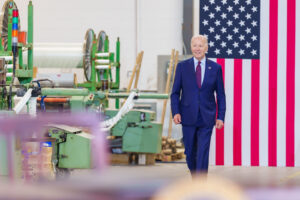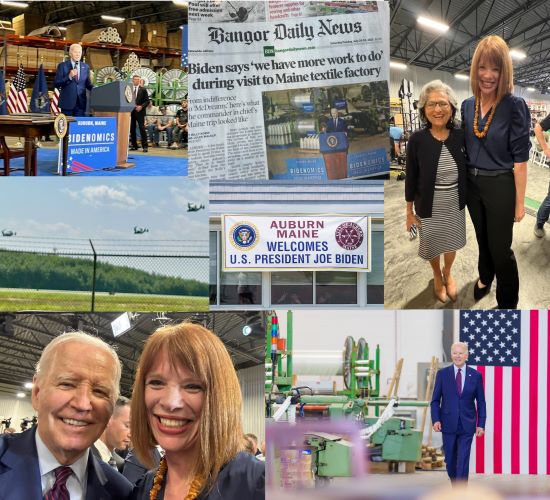President Biden’s Historic Visit to Auburn Manufacturing Inc. (AMI)

Source: White House
President Biden’s historic visit to Auburn Manufacturing on Friday elevated our industry’s profile and reinforced its competitiveness and economic contribution in regional and national media headlines and news video clips across the country.
AMI CEO Kathie Leonard introduced President Biden and outlined the challenges her company has faced over the years, including inflation, unfair import competition and a once-in-a generation pandemic that nearly derailed her company. But a major battle she won against Chinese companies dumping silica fabric on the U.S. market, combined with federal policies aimed at bolstering U.S. manufacturing have led to a new era of revitalization and growth.
“We started in Mechanic Falls with two people (I was one of them) and have expanded exponentially over time. We are now in two places…and we now have over 50 people and we are track to increase our workforce by another 30 percent,” Leonard said.
“Growing a business, especially exponentially isn’t easy. We experienced many challenges over the years. First of all, the interest rate; it was 14 percent when we started building our first building. That’s pretty high. Secondly, China’s dumping of silica fabric, one of our major products, stole 30 percent of our domestic industry by 2016 and that forced us to file an antidumping case against China, and it was successful but very expensive.
Then, COVID hit just as we were recovering from what we’d been through the last several years. That was a really difficult time for all of us.
Leonard credited several policies, including the American Rescue Plan, and a focus on American manufacturing as catalysts that helped keep Auburn afloat and reignite the U.S. economy.
“So, we’re now back. We’re growing our workforce again. We are entering new markets and we’re upgrading our plants and equipment. While our tagline is ‘Innovation on Fire,’ we were on the brink of flaming out for a while. It really is now Innovation Reignited.”
To see a video clip highlighting key points from remarks by President Biden and Auburn’s Kathie Leonard please clip on the box or link below:
NCTO President and CEO Kim Glas was also in attendance at this historic presidential visit at Auburn Manufacturing and had a chance to meet briefly with President Biden. She said she talked about the importance of his visit to Auburn and to the whole U.S. textile industry. She also emphasized the resilience and competitiveness of our industry and stressed that with the help of his administration promoting policies to spur more onshoring and nearshoring, the industry will continue to be an important and vital contributor to the U.S. economy.
In his remarks, President Biden outlined the challenges manufacturing industries, such as textiles and paper, have faced over the past two decades, particularly in Maine, where Auburn Manufacturing is located.
He said past administrations and other economic policies led to the offshoring of manufacturing that “hollowed out” the U.S. manufacturing sector. “What did most of these guys do? They decided to send the jobs overseas where the labor was cheaper and bring the product made back to the United States more expensive. Entire towns and communities got hollowed out not just here in Maine, but all across America. This is not just for Maine, this is all of America. Small towns and medium-sized towns all across America factories got shut down,” Biden said.
President Biden pointed to a few examples of companies bearing the brunt of offshoring in Auburn and Lewiston, Maine.
“Let me remind you of a few examples: Auburn and Lewiston, right next door, used to be home to some of the country’s largest textile mills. Bates Manufacturing was the largest employer in Maine with thousands of employees supplying the country with high-quality cloth and quilts,” he said.
Bates Manufacturing survived the Civil War, the Great Depression, and two World Wars. But in the 1990s, American textile production moved overseas, and Bates closed up shop. And by the way, my state used to be a gigantic producer of textile, the DuPont Company.”
He also highlighted similar examples of the impact on Maine’s iconic paper industry, which lost 8,000 jobs over the past two decades, he said.
“Take the Verso mill in Bucksport. Founded in [1929]. [It] provided generations of good jobs and up to 40 percent — 47 percent of the town’s tax revenue. A decade ago, it closed down, devastating the town, like so many thousands of towns all across America,” Biden noted.
Between 1990 and 2010, Maine lost nearly 45,000 manufacturing jobs, he said.
“And like we saw across the country, once-thriving cities and towns became shadows of what they used to be. And when these towns were hollowed out, something else was lost as well. And I come from Northeast Pennsylvania; I know about shutting down towns. Pride — people lost their pride.
Folks, this is what trickle-down economics looks like. But now we’re turning things around.”
Biden pointed to Kathie Leonard’s Auburn Manufacturing as a success story as he stood in the center of her state-of-the art facility surrounded by her employees and other invited guests.
“Like here at Auburn Manufacturing, now, you heard Kathie talk about starting this company 40 years ago making advanced textiles that are fire and heat resistant. They weathered decades of economic storms. Now with the help of the American Rescue Plan, they’re having their biggest export year ever. The company is growing, and their products are made in America.”
You can view a full transcript of President Biden’s remarks here.
To listen to the full White House Clip of the event please click here.


